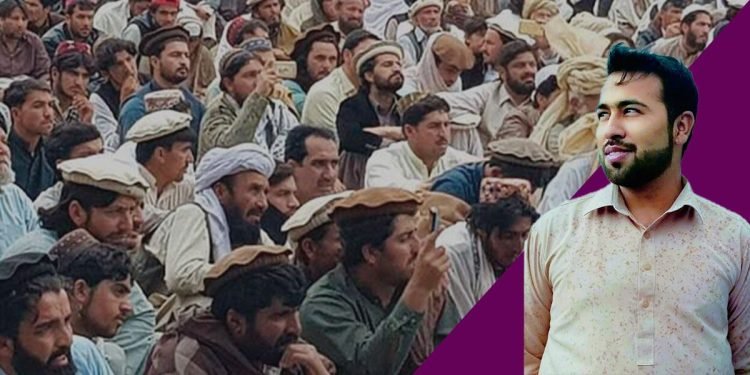Rehan Khan
The rise of the Pashtun Tahafuz Movement (PTM) has revolved around awareness of the Pakistani state’s mistreatment of Pashtuns. Many supporters of the movement have criticised the state for how Pashtuns are targeted with racist abuse and discriminated against on suspicions of being terrorists. But the movement has especially discussed how this inhumane treatment extends back to the British rule under which the Frontier Crimes Regulation (FCR), introduced in 1901, was designed to dehumanise the community.
During the British Raj, the law was introduced for the Federally Administered Tribal Areas (FATA), which was a vast chunk of land between Pakistan and Afghanistan, and completely inhabited by Pashtuns. The law was designed in order to prohibit the citizens living in FATA from integrating with the rest of the territories. As Zuha Siddiqui writes for Dawn, “Transformed tribesmen into imperial vassals, denied them access to colonial courts and Raj governance and yet, expected them to act in accordance with the interests and concerns of the overarching imperial state.”
In 1947, when the Pakistani state was created and the British had left, the Pashtun community living in FATA found no change in their living circumstances and continued to suffer under coercion and oppression.
The leader of PTM, Manzoor Pashteen, has consistently raised his voice about the oppression and suffering Pashtuns face in Pakistan such as through extrajudicial killings, and even the growing list of disappearances. Pashteen has talked about ethnic cleansings taking place in areas of Punjab and Sindh, because of which Pashtuns are repeatedly racially profiled and targeted by the police on terrorist suspicions. Awareness about missing persons has also grown over the years that PTM has addressed the issue in their rallies. Thousands of families have attended rallies in cities like Peshawar, holding posters of their family members who had been picked up by law enforcing agencies.
However, regardless of the strength of the movement, media blackout over the coverage of rallies has remained in place. Many government officials have refused to elaborate on their decision to refuse coverage of PTM rallies.
What’s next?
Although the PTM has repeatedly stated that they are a peaceful movement for the past three years, the government has still refused to hold constructive communication with them. In order to prevent further problems in the future and the silencing of Pashtun voices, it is time that Pakistani authorities recognise the efforts of PTM and listen to their demands with an open mind.


